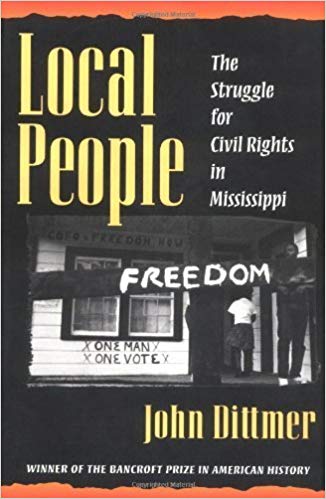Names like Bob Moses, Fannie Lou Hamer, and Vernon Dahmer should be as familiar to Mississippians as those of Washington, Lee, and Grant, and Mississippi school children should be as a acquainted with the events surrounding the assassination of Medgar Evers as those of Abraham Lincoln.
History buffs should possess the knowledge to trace the strategic battles for civil rights in Mississippi with as much attention to detail as they give to the battles of the Civil War. John Dittmer recounts that conflict well in Local People: The Struggle for Civil Rights in Mississippi. Covering the pivotal years of 1946-1966, the author tells the story of the heroic efforts to end Jim Crow segregation and secure voting rights for African American citizens.
His emphasis on local leaders is much needed. If civil rights history is taught in schools, it tends to focus on individuals who gained national prominence, men like Martin Luther King Jr., Thurgood Marshall, and Roy Wilkins, or, if mentioned at all, influential women like Ella Baker, Diane Nash, and Septima Clark. National organizations (for example, the NAACP and the Southern Christian Leadership Conference) are more likely to be studied than local organizations and coalitions, formal and informal, that labored for justice in Southern states. These people and organizations are part of Mississippi’s struggle and this book.
But frequently overlooked are the efforts of Mississippi citizens who carried on civil rights work far from the national spotlight. Their labors, even when performed under the umbrella of national organizations, were confined to the state and easily forgotten. Dittmer remedies this neglect. His fine narrative tells the complex story of local people who fought to an end government-mandated white supremacy and segregation.
When I read civil rights history, I have four goals in mind: to understand the moral choices people made, to consider how past history shapes current experience, to remember that – without vigilance – hard-won advancements can be forfeited, and to clarify the considerable work that remains.
Christians especially need to note that Jim Crow era is the story of the dominant culture, most of whom were professing Christians, supporting a social structure that denied basic civil rights and human dignity to fellow image bearers of God, many of whom were also brothers and sisters in the Christian faith. God is judge, not me. But I want to understand lest I, through ignorance, sinful defiance, or tacit cooperation, perpetuate sinful patterns of injustice.
I recommend reading this book as preparation or follow-up to a trip to the Mississippi Civil Rights Museum.

2 Comments
Hola Pastor Charlie,
Per your recommendation, I will read this as soon as I finish “Dispatches from Pluto”, suggested by Joe Crowhurst. Miss you bro, carry on the good work.
Great to hear from you, Bob! I hope our paths cross again soon!